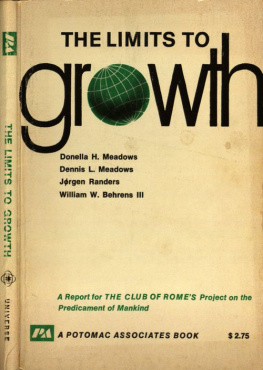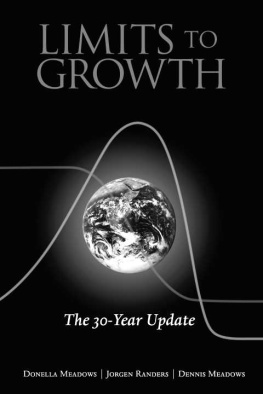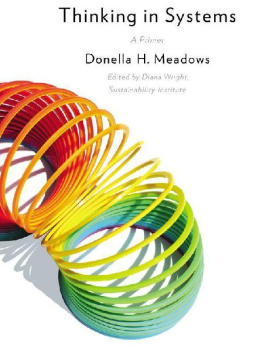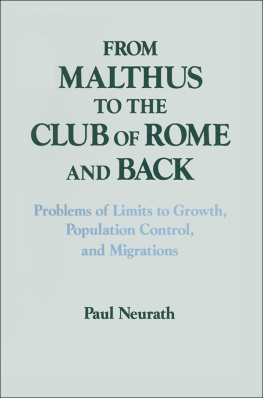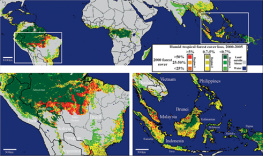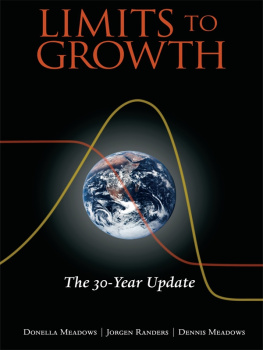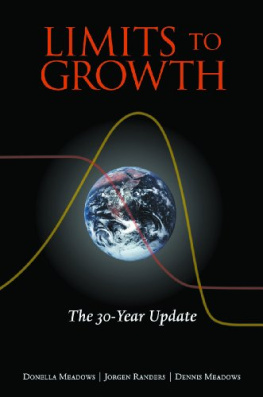Donella H. Meadows - The Limits to Growth: A Report for the Club of Rome’s Project on the Predicament of Mankind
Here you can read online Donella H. Meadows - The Limits to Growth: A Report for the Club of Rome’s Project on the Predicament of Mankind full text of the book (entire story) in english for free. Download pdf and epub, get meaning, cover and reviews about this ebook. year: 1972, publisher: Potomac Associates, genre: Politics. Description of the work, (preface) as well as reviews are available. Best literature library LitArk.com created for fans of good reading and offers a wide selection of genres:
Romance novel
Science fiction
Adventure
Detective
Science
History
Home and family
Prose
Art
Politics
Computer
Non-fiction
Religion
Business
Children
Humor
Choose a favorite category and find really read worthwhile books. Enjoy immersion in the world of imagination, feel the emotions of the characters or learn something new for yourself, make an fascinating discovery.
- Book:The Limits to Growth: A Report for the Club of Rome’s Project on the Predicament of Mankind
- Author:
- Publisher:Potomac Associates
- Genre:
- Year:1972
- Rating:3 / 5
- Favourites:Add to favourites
- Your mark:
- 60
- 1
- 2
- 3
- 4
- 5
The Limits to Growth: A Report for the Club of Rome’s Project on the Predicament of Mankind: summary, description and annotation
We offer to read an annotation, description, summary or preface (depends on what the author of the book "The Limits to Growth: A Report for the Club of Rome’s Project on the Predicament of Mankind" wrote himself). If you haven't found the necessary information about the book — write in the comments, we will try to find it.
The Limits to Growth: A Report for the Club of Rome’s Project on the Predicament of Mankind — read online for free the complete book (whole text) full work
Below is the text of the book, divided by pages. System saving the place of the last page read, allows you to conveniently read the book "The Limits to Growth: A Report for the Club of Rome’s Project on the Predicament of Mankind" online for free, without having to search again every time where you left off. Put a bookmark, and you can go to the page where you finished reading at any time.
Font size:
Interval:
Bookmark:
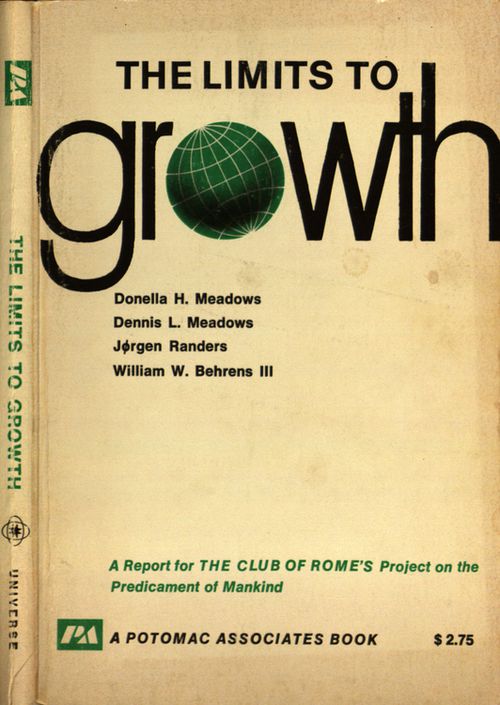
HOPES AND FEARS OF THE AMERICAN PEOPLE
POTOMAC ASSOCIATES is a nonpartisan research and analysis organization which seeks to encourage lively inquiry into critical issues of public policy. Its purpose is to heighten public understanding and improve public discourse on significant contemporary problems, national and international.
POTOMAC ASSOCIATES provides a forum for distinctive points of view through publication of timely studies and occasional papers by outstanding authorities in the United States and abroad. Although publication implies belief by Potomac Associates in the basic importance and validity of each study, views expressed are those of the author.
POTOMAC ASSOCIATES is a nontaxexempt firm located at 1707 L Street NW, Washington, DC 20036.
A POTOMAC ASSOCIATES BOOK
Donella H. Meadows
Dennis L. Meadows
Jrgen Randers
William W. Behrens III
Universe Books
NEW YORK
All rights reserved. No part of this publication may be reproduced, stored in a retrieval system, or transmitted in any form or by any means, electronic, mechanical, photocopying, recording, or otherwise, without the prior permission of Potomac Associates.
Second printing before publication 1972
Third printing 1972
Fourth printing 1972
Fifth printing 1972
Library of Congress Catalog Card Number: 73187907
ISBN 0876631650
Design by Hubert Leckie
Printed in the United States of America
Published in the United States of America in 1972 by Universe Books,
381 Park Avenue South, New York, New York 10016
1972 by Dennis L. Meadows
DOI: 10.1349/ddlp.1
To Dr. Aurelio Peccei, whose profound concern for humanity has inspired us and many others to think about the world's longterm problems
| Dr. Dennis L. Meadows , director, United States |
| Dr. Alison A. Anderson , United States ( pollution ) |
| Dr. Jay M. Anderson , United States ( pollution ) |
| Ilyas Bayar , Turkey ( agriculture ) |
| William W. Behrens III , United States ( resources ) |
| Farhad Hakimzadeh , Iran ( population ) |
| Dr. Steffen Harbordt , Germany ( sociopolitical trends ) |
| Judith A. Machen , United States ( administration ) |
| Dr. Donella H. Meadows , United States ( population ) |
| Peter Milling , Germany ( capital ) |
| Nirmala S. Murthy , India ( population ) |
| Roger F. Naill , United States ( resources ) |
| Jrgen Randers , Norway ( pollution ) |
| Stephen Shantzis , United States ( agriculture ) |
| John A. Seeger , United States ( administration ) |
| Marilyn Williams , United States ( documentation ) |
| Dr. Erich K. O. Zahn , Germany ( agriculture ) |
IN APRIL 1968, a group of thirty individuals from ten countriesscientists, educators, economists, humanists, industrialists, and national and international civil servantsgathered in the Accademia dei Lincei in Rome. They met at the instigation of Dr. Aurelio Peccei, an Italian industrial manager, economist, and man of vision, to discuss a subject of staggering scopethe present and future predicament of man.
THE CLUB OF ROME
Out of this meeting grew The Club of Rome, an informal organization that has been aptly described as an "invisible college." Its purposes are to foster understanding of the varied but interdependent componentseconomic, political, natural, and socialthat make up the global system in which we all live; to bring that new understanding to the attention of policymakers and the public worldwide; and in this way to promote new policy initiatives and action.
The Club of Rome remains an informal international association, with a membership that has now grown to approximately seventy persons of twentyfive nationalities. None of its members holds public office, nor does the group seek to express any single ideological, political, or national point of view. All are united, however, by their overriding conviction that the major problems facing mankind are of such complexity and are so interrelated that traditional institutions and policies are no longer able to cope with them, nor even to come to grips with their full content.
The members of The Club of Rome have backgrounds as varied as their nationalities. Dr. Peccei, still the prime moving force within the group, is affiliated with Fiat and Olivetti and manages a consulting firm for economic and engineering development, Italconsult, one of the largest of its kind in Europe. Other leaders of The Club of Rome include: Hugo Thiemann, head of the Battelle Institute in Geneva; Alexander King, scientific director of the Organization for Economic Cooperation and Development; Saburo Okita, head of the Japan Economic Research Center in Tokyo; Eduard Pestel of the Technical University of Hannover, Germany; and Carroll Wilson of the Massachusetts Institute of Technology. Although membership in The Club of Rome is limited, and will not exceed one hundred, it is being expanded to include representatives of an ever greater variety of cultures, nationalities, and value systems.
THE PROJECT ON THE PREDICAMENT OF MANKIND
A series of early meetings of The Club of Rome culminated in the decision to initiate a remarkably ambitious undertakingthe Project on the Predicament of Mankind.
The intent of the project is to examine the complex of problems troubling men of all nations: poverty in the midst of plenty; degradation of the environment; loss of faith in institutions; uncontrolled urban spread; insecurity of employment; alienation of youth; rejection of traditional values; and inflation and other monetary and economic disruptions. These seemingly divergent parts of the "world problematique," as The Club of Rome calls it, have three characteristics in common: they occur to some degree in all societies; they contain technical, social, economic, and political elements; and, most important of all, they interact.
It is the predicament of mankind that man can perceive the problematique, yet, despite his considerable knowledge and skills, he does not understand the origins, significance, and interrelationships of its many components and thus is unable to devise effective responses. This failure occurs in large part because we continue to examine single items in the problematique without understanding that the whole is more than the sum of its parts, that change in one element means change in the others.
Phase One of the Project on the Predicament of Mankind took definite shape at meetings held in the summer of 1970 in Bern, Switzerland, and Cambridge, Massachusetts. At a twoweek conference in Cambridge, Professor Jay Forrester of the Massachusetts Institute of Technology (MIT) presented a global model that permitted clear identification of many specific components of the problematique and suggested a technique for analyzing the behavior and relationships of the most important of those components. This presentation led to initiation of Phase One at MIT, where the pioneering work of Professor Forrester and others in the field of System Dynamics had created a body of expertise uniquely suited to the research demands.
Font size:
Interval:
Bookmark:
Similar books «The Limits to Growth: A Report for the Club of Rome’s Project on the Predicament of Mankind»
Look at similar books to The Limits to Growth: A Report for the Club of Rome’s Project on the Predicament of Mankind. We have selected literature similar in name and meaning in the hope of providing readers with more options to find new, interesting, not yet read works.
Discussion, reviews of the book The Limits to Growth: A Report for the Club of Rome’s Project on the Predicament of Mankind and just readers' own opinions. Leave your comments, write what you think about the work, its meaning or the main characters. Specify what exactly you liked and what you didn't like, and why you think so.

